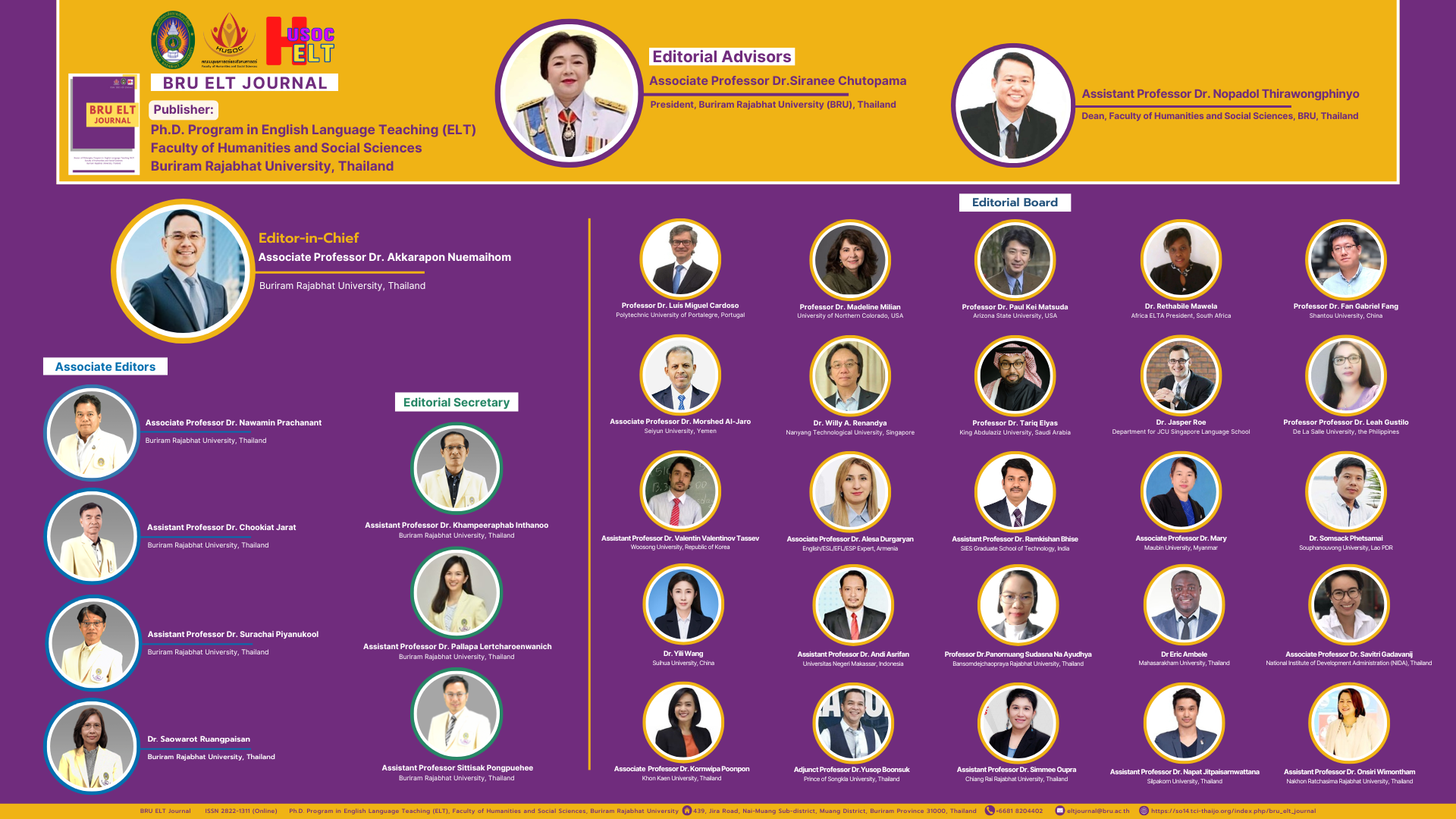Effects of Cooperative Learning Strategy on Enhancing EFL Tertiary Students' Writing Skills
DOI:
https://doi.org/10.14456/bej.2023.17Keywords:
cooperative learning, EFL, writing skill, EFL tertiary studentsAbstract
The study aimed to examine the effect of co-operative learning on developing EFL tertiary students’ writing skills. Forty-one EFL students at a public university in Yemen were selected to participate in this study. They were taught writing through the traditional method of teaching adopted by the teachers in the college for a month and a half. Then they were taught writing through using co-operative learning strategy for another month and a half. Three pre-tests and three post-tests as well as attitudinal questionnaire were used to collect the data of the study. The study employed descriptive statistics, inferential analysis as well as the effect size to determine the effect of co-operative learning on developing the students' writing skill. The results of the tests revealed that the students' scores of the post-tests after using the co-operative learning strategy were significantly better than their scores of the pre-tests after using the traditional method. The results of the questionnaire responses showed that the students’ attitudes towards co-operative learning were positive. The study has come up with some recommendations for educators and for future researches concerning the issue in question.
References
Alhaidari, S. M. (2006). "The effectiveness of using cooperative learning to promote reading comprehension, vocabulary, and fluency achievement scores of male fourth-and fifth-grade students in Saudi Arabian school." The Pennsylvania State University. http://faculty.ksu.edu.sa/alhaidari/Documents/Ph.D.pdf
Al-Haddadi, K. S. (2014). Time management with the principals of general education schools in Hadhramout Governorate. Unpublished master thesis, Hadhramout University, Mukalla, Yemen.
Al-Jaro, M. S. (2016). The effect of prewriting techniques on Yemeni EFL tertiary learners’ writing skills. Academic Journal of Humanities and Social Sciences Buriram Rajabhat University, 8(Special), 111-126.
Al-Tamimi, N., & Ambigapathy P. (2008). “Explicit strategy instruction in metacognitive awareness of reading strategies: A bridge to the development of skilled readers.” A paper presented in the International Higher Education Policy Research and management Forum-University Sains Malaysia.
Al-Tamimi, N., & Attamimi, R. (2014). Effectiveness of cooperative learning in enhancing speaking skills and attitudes towards learning English. International Journal of Linguistics, 6(4), 27-45. doi:10.5296/ijl.v6i4.6114
Al-Yaseen, W. S. (2014). Cooperative learning in the EFL classroom. WEI International Academic Conference Proceedings. Vienna, Austria. www.westeastinstitute.com/wpcontent/uploads/2014/05/wafaasalem-Full-Paper.pdf
Assamawi, A. M. (2000). Research techniques in linguistics and literature. Educational Copying Center.
Balhuwaisal, M. A. (2006). Spectrum analysis of the production of dates in the republic of Yemen. Unpublished master thesis, University Sains Malaysia, Malaysia.
Baliya, R. (2013). Enhancing writing abilities of primary class students through co-operative learning strategies: An experimental study. International Journal of Behavioral Social and Movement Sciences, 02(01), 294-305.
Bolukbas, F., Keskin, F., & Polat, M. (2011). The effectiveness of co-operative learning on the reading comprehension skills in Turkish as a foreign language. TOJET: The Turkish Online Journal of Educational Technology, 10 (4), 330-335.
Bose, M. N. (2002). A text book of English language teaching (ELT) Yemeni students: A guide for teaching English in Yemen school. Obadi Studies and Publishing Centre.
Brown, H.D. (2014). Principles of language learning and teaching: A course in second language acquisition (6th ed.). Cambridge University Press.
Cohen, J. (1992). Quantitative methods in psychology: A power primer. Psychological Bulletin, 112 (1), 155-159
Creswell, J. (2012). Educational research: planning, conducting and evaluating quantitative and qualitative research (4th ed.). Pearso Education.
Duxbury, J. G., & Tsai, L. (2010). The effects of cooperative learning on foreign Language anxiety: A comparative study of Taiwanese and American universities. International Journal of Instruction, 3(1), 3-18.
Farrah, M. A. (2011). Attitudes towards collaborative writing among English majors in Hebron University. Arab World English Journal, 2(3), 136-170.
Farzaneh, N., & Nejadansari, D. (2014). Students’ attitude towards using cooperative learning for teaching reading comprehension. Theory and Practice in Language Studies, 4(2), 287-292. doi:10.4304/tpls.4.2.287-292.
Gottman, J., Mcfall, R., & Barnett, J. (1969). Design and analysis of research using time series. Psychological Bulletin, 72(4), 299-306.
Hamp-Lyons, L., & Heasley, B. (1987). Study writing: A course in written English for academic and professional purposes. The Cambridge University Press.
Harmer, J. (2006). The practice of English language teaching (3rd ed.). Pearson Education Limited.
Hughes, A. (1989). Testing for language teachers. Cambridge University Press.
Huss, J. A. (2006). Gifted education and cooperative learning: A miss or a match? Gifted Child Today, 29(4), 19-23. http://files.eric.ed.gov/fulltext/EJ746306.pdf
Jackson, L. (2006). Research methods and statistics: A critical thinking approach (2nd ed.). Thomson Learning Academic Resource Center.
Jacobsen, D., Eggen, P., & Kauchak, D. (1993). Methods for teaching: A skill approach (4th ed.). Prentice Hall Inc.
Javid, C. Z., Farooq, U., & Gulzar, M. A. (2012). Saudi English-major undergraduates and English Teachers' perceptions regarding effective ELT in the KSA: A comparative study. European Journal of Scientific Research, 85(1), 55-70.
Javid, C. Z., & Khairi, M. H. (2011). The role of pleasure reading in enhancing reading speed and reading comprehension. Arab World English Journal, 2(4), 219-256.
Johnson, D. W., & Johnson, R. T. (1999). Learning together and alone: Cooperative competitive, and individualistic learning (5th ed.). prentice-hall.
Johnson, D.W., Johnson, R.T., & Stane, M.E. (2000). Cooperative learning methods: metal analysis. Cooperative learning centre. http://www.pubmedcentral.org/direct3.egi
Jones, K., & Jones, J. (2008). Making cooperative learning work in the college classroom: An application of the ‘five pillars’ of cooperative learning to post-secondary instruction. The Journal of Effective Teaching, 8(2), 61-76.
Kagan, S. (1992). Cooperative learning. Kagan Publishing.
Kellogg, R. T. (2008). Training writing skills: A cognitive developmental perspective. Journal of Writing Research, 1(1), 1-26.
Likert, R. A. (1932). A technique for the measuement of attitudes. Archives of Psychology. No. 40.
Lim, S. (2002). Writing in English: A study on the use of co-operative learning among form one students in Sekolah Menegah Kebangsaan Georgetown, Pulaupinang. Unpublished Master thesis. Universiti Sains Malaysia.
Mahmoud, M. M. (2014). The effectiveness of using the cooperative language learning approach to enhance EFL writing skills among Saudi University Students. Journal of Language Teaching and Research, 5(3), 616-625. doi:10.4304/jltr.5.3.616-625
Mandal, R. R. (2009). Cooperative learning strategies to enhance writing skill. MJAL: The modern journal of applied linguistics, 1(2), 93-102.
McLeish, K. (2009). Attitude of students towards cooperative learning methods at Knox Community College: A Descriptive Study. University of Technology. http://files.eric.ed.gov/fulltext/ED506779.pdf
Morshid, M. G., & Awahd, A. (2013). The effect of CL on developing reading comprehension in English language among 2nd level secondary school students. Unpublished thesis.
Naif, M. O. (2003). A study of Yemeni EFL college student writers' composition strategies and skills. Unpublished Master thesis, Sana'a University.
Nunan, D. (1991). Language teaching methodology: A textbook for teachers. Prentice Hall International (UK) Ltd.
Nunan, D. (1992). Collaborative language teaching. Cambridge University Press.
Oludipe D., & Awokoy J. (2010). Effect of cooperative learning teaching strategy on the reduction of students’ anxiety for learning chemistry. Journal of Turkish Science Education, 7(1), 30-36.
O'Neill, T., Snow, P., & Webb, R. (1995). Crescent English course – Teacher's book. Oxford University Press.
Oshima, A., & Hogue, A. (1997). Introduction to academic writing. Addison Weslry Longman.
Palaigeorgiou, G. E., Siozos, P.D., Konstantakis, N.I., & Tsoukalas, I.A. (2005). A computer attitude scale for computer science freshmen and its educational implications. Journal of Computer Assisted Learning, 21,5, 330-342.
Rababah, G. (2003). Communication problems facing Arab learners of English: A personal perspective. TEFL Web Journal, 2(1), 15
Raymond, S. M. (2008). Effective and ineffective university teaching from the students’ and faculty’s perspectives: Matched or mismatched expectations? Thesis submitted to the University of Exeter in part requirement for the Doctor of Education (EdD). http://eric.exeter.ac.uk/exeter/bitstream/ 10036/40767/6/RaymondS.pdf
Richards, J. (2006). Communicative language teaching today. Cambridge University Press.
Rijlaarsdam, G., Braaksma, M., Couzijn, M., Janssen, T., Raedts, M., Steendam, E., Toorenaar, A., & Bergh, H. (2008). Observation of peers in learning to write, practice and research. Journal of Writing Research, 1(1), 53-83.
Romero, C. (2009). Co-operative learning instruction and science achievement for secondary and early post-secondary students: A systematic review. Unpublished Doctoral Dissertation, Colorado State University.
Ruengtam, P. (2013). Modeling of cooperative/collaborative learning technique: A case study of interior architectural program. Procedia - Social and Behavioral Sciences 105 (2013) 360-369.
Saif, A. (2007). The impact of cooperative learning approach on students' achievement in Biology. Taiz University.
Schniedewind, N. (2004). Educating teachers for socially conscious cooperative learning. Teaching cooperative learning. University of New York. https://saidnazulfiqar.files.wordpress.com/.../teaching-cooperative-learning
Seng, H. (2006). Cooperative learning and achievement in English language acquisition in a literature class in a secondary school. Unpublished Master Dissertation, University Technology Malaysia.
Siti, K. J. (2004). Second language writing: From knowledge to application. English language teaching, transition in ELT: Challenges and prospects. Faculty of Education: Universiti Kebangsaan Malaysia.
Slavin, R. E. (1985). An introduction to cooperative learning research, learning to cooperate, cooperating to learn. Plenum Press.
Slavin, R. E. (1995). Cooperative learning: Theory, research and practice. Prentice Hall.
Stevens, R. J., & Salvin, R. E. (1995). Effects of cooperative learning approach in reading and writing on academically handicapped and non handicapped students. The Elementary School Journal, 95(3),241-262.
Stockburger, D. W. (2005). Multiple regression with two predictor variable, multivariate statistics: Concepts, models and applications. Missouri State University.
Tierney, R. (1989). The effects of reading and writing upon thinking critically. Reading Research Quarterly 25, 136-137.
Voon Foo, C. T. (2007). The effects of the process-genre approach to writing instruction on the expository essays of ESL students in a Malaysian Secondary School. Unpublished PhD thesis, Universiti Sains Malaysia.
Wang, P. (2009). The inter-rater reliability in scoring composition. English Language Teaching, 2(3), 39-43. http: //www.ccsenet.org/journal/index.php/etl/article/.../3282
Wang, T. (2007). The comparison of the difficulties between cooperative learning and traditional teaching methods in college English teachers. The Journal of Human Resource and Adult Learning, 3(2), 23-30.
White, R.V. (1988). Academic writing: Process and product. ELT Documents 129. The British Council, 4-16.
White, R., & Arndt, V. (1991). Process writing. Longman.
Wu, K. (2010). The Relationship between language learners’ anxiety and learning strategy in the CLT classrooms. International Education Studies, 3(1), 174-191.
Zamanian, M., & Bagheri, M. (2013). The effect of cooperative learning approach on Iranian EFL students' achievement among different majors in general English course. International Journal of Linguistics, 5(6), 1-11. doi:10.5296/ijl.v5i6.4691.
Zhang, Y. (2010). Cooperative language learning and foreign language learning and teaching, Journal of Language Teaching and Research, 1(1), 81-83. doi:10.4304/jltr.1.1.81-83






